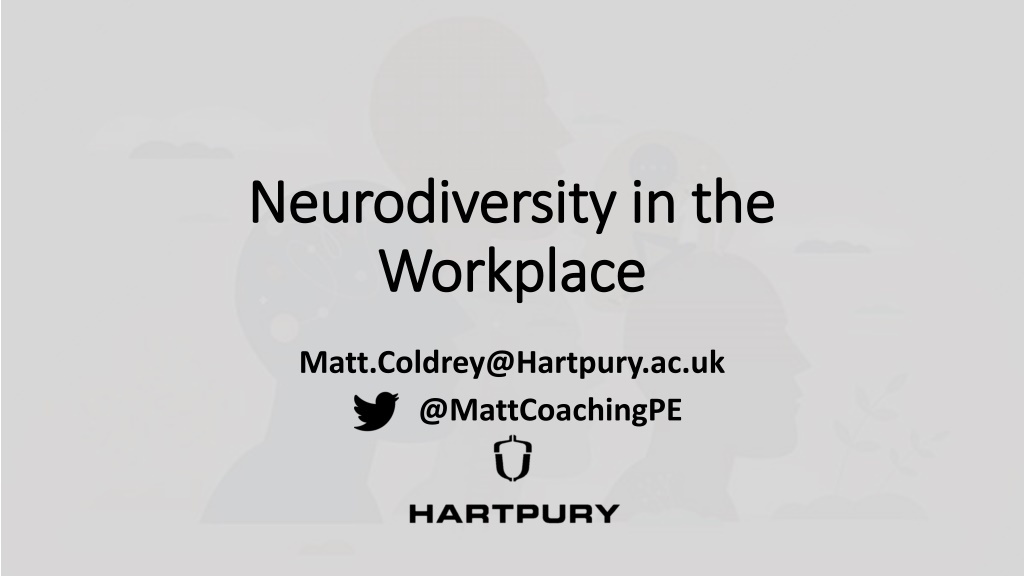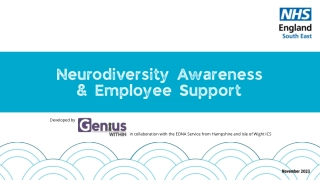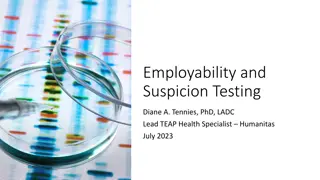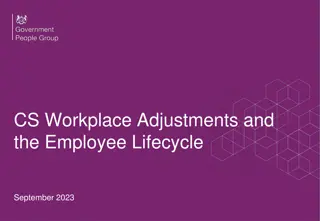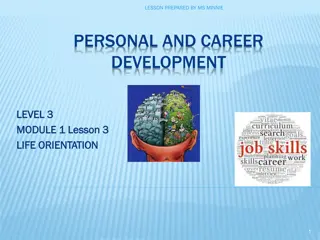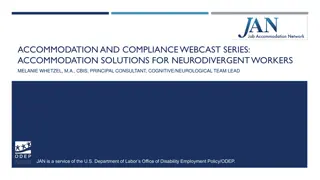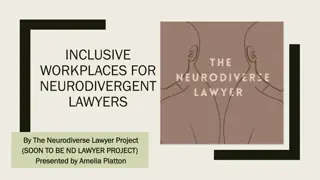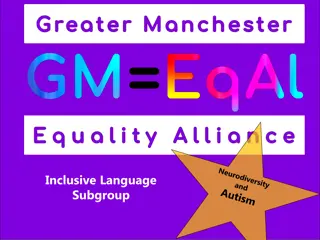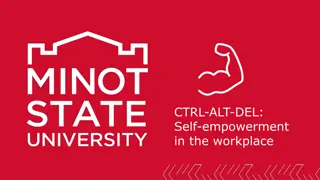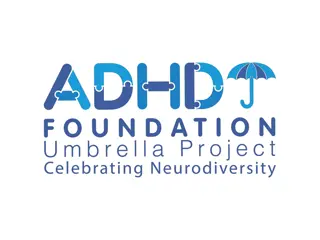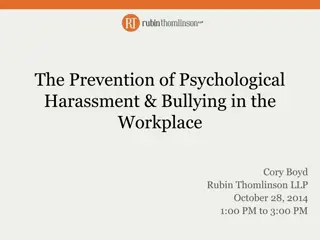Understanding Neurodiversity in the Workplace
Explore the concept of neurodiversity, its manifestations in the workplace, and the role it plays for individuals with conditions such as ADHD, Autism, and Dyslexia. Learn how workplaces can be more inclusive and supportive of neurodiverse individuals.
Download Presentation

Please find below an Image/Link to download the presentation.
The content on the website is provided AS IS for your information and personal use only. It may not be sold, licensed, or shared on other websites without obtaining consent from the author. Download presentation by click this link. If you encounter any issues during the download, it is possible that the publisher has removed the file from their server.
E N D
Presentation Transcript
Neurodiversity in the Neurodiversity in the Workplace Workplace Matt.Coldrey@Hartpury.ac.uk @MattCoachingPE
Todays Session Today s Session Who am I? Some of you know me already I used to work at AG, Sports Coaching Lecturer, diagnosed with ADHD as an adult. What s today s session about? What neurodiversity is, and how it can manifest in the workplace (spoiler alert it s very varied and complex) with a focus on ADHD, Autism and Dyslexia Consider how workplaces can become more neurodiverse friendly and what role you can all play
Why me? Why me? I used to work at AG with undiagnosed ADHD Those of you who worked with me will have noticed: Quick to become frustrated Chatty and distractable Opinionated/lacking filter Clashed with the old CEO Embodied experiences and peer reviewed research informed
TASK: TASK: With the people around you discuss what your definitions of neurodiversity are this is not a test so do not worry, like I said, they are complex conditions with multiple current theories explaining them.
What is Neurodiversity? What is Neurodiversity? Neurodiversity refers to the natural differences in neurological functioning that are a normal and valuable aspect of human diversity. It is an umbrella term for autism, attention deficit hyperactivity disorder (ADHD), dyscalculia, dyslexia, and dyspraxia, and sometimes includes conditions such as dysgraphia, mysophobia, slow processing, stammering, and Tourette s syndrome. Neurodivergence is often categorised separately from mental health conditions, like anxiety or depression, because it doesn t appear suddenly in adulthood or after a pivotal experience. Regarding the workplace, neurodiversity is a protected characteristic under the Equality Act (2010), and neurodiverse employees are entitled to reasonable adjustments under UK law.
Basic definitions: ADHD Basic definitions: ADHD ADHD: characterised by executive dysfunction and emotional dysregulation stemming from dysregulation in dopamine production and absorption making it difficult to utilise the logical and rational parts of the brain. It is not a lack of attention or hyperactivity! It is a lack of control on what attention is paid to and seeking dopamine reward (gratification). Attention Deficit Hyperactivity Disorder is a misleading name, a better name is: Variable Attention Stimulus Trait
Basic definitions: Autism Basic definitions: Autism Autism: a very complex condition that is a spectrum of disorders. It can often manifest as a lack of social awareness (how to act appropriately ) and executive dysfunction (like ADHD, not being able to control where attention is paid). The Prefrontal Cortex is not sufficiently activated in autism. The prefrontal cortex has been implicated in planning complex cognitive behaviour, personality expression, decision making, and moderating social behaviour. Another aspect of autism is the lower than typical levels of serotonin in the brain, the soothing chemical this is one area where Autism and ADHD overlap.
Some key statistics: Some key statistics: 1 in 10 people in the UK are neurodiverse. Neurodiversity is underdiagnosed in the UK, especially in women and minority groups. Neurodivergent people are more likely to be unemployed than non- neurodivergent people. The unemployment rate for neurodivergent people is 21.7%, compared to 4.8% for non-neurodivergent people. Neurodivergent people are more likely to be in low-paid jobs than non- neurodivergent people. The average weekly pay for neurodivergent people is 440, compared to 520 for non-neurodivergent people. Neurodivergent people are more likely to experience discrimination in the workplace. A survey of neurodivergent people found that 60% had experienced discrimination at work, such as being passed over for promotion, being bullied, or being made to feel uncomfortable.
Blue dopamine Green serotonin Red adrenaline and cortisol
Behaviours that characterise: Behaviours that characterise: ADHD Impulsiveness Hyperactivity Inattentiveness Over arousal Lack of emotional self-control Caring/justice orientated Shortsightedness Autism - Intense world-theory Hyper-perception Hyper-attention Hyper-memory Hyper-emotionality Strong reactions to experiences Seeking solitude, familiarity and comfort Withdrawal from overstimulating environments
How being neurodiverse can feel How being neurodiverse can feel Feeling isolated or misunderstood. Struggling to keep up with the pace of work or study. Finding it difficult to communicate with colleagues or classmates. Feeling overwhelmed by sensory input. Feeling like an outsider and not knowing why. Regret following impulsive behaviours.
Discussion: What are your thoughts so far? Discussion: What are your thoughts so far?
Discussion Discussion In small groups answer the following questions: What adjustments do you think AG could make to make it a neurodiverse friendly workplace? What amendments might you make to your own working practices? What steps could you make to be a neurodivergent ally?
